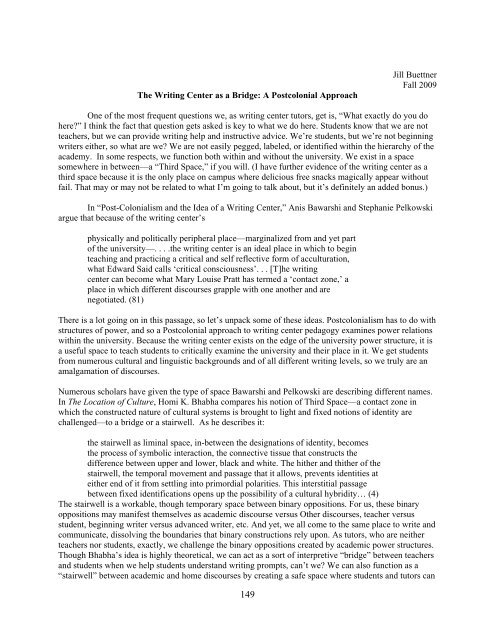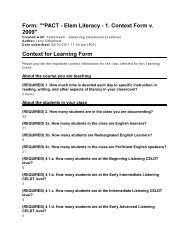The Tutoring Book - California State University, Sacramento
The Tutoring Book - California State University, Sacramento
The Tutoring Book - California State University, Sacramento
You also want an ePaper? Increase the reach of your titles
YUMPU automatically turns print PDFs into web optimized ePapers that Google loves.
<strong>The</strong> Writing Center as a Bridge: A Postcolonial Approach<br />
149<br />
Jill Buettner<br />
Fall 2009<br />
One of the most frequent questions we, as writing center tutors, get is, “What exactly do you do<br />
here?” I think the fact that question gets asked is key to what we do here. Students know that we are not<br />
teachers, but we can provide writing help and instructive advice. We’re students, but we’re not beginning<br />
writers either, so what are we? We are not easily pegged, labeled, or identified within the hierarchy of the<br />
academy. In some respects, we function both within and without the university. We exist in a space<br />
somewhere in between—a “Third Space,” if you will. (I have further evidence of the writing center as a<br />
third space because it is the only place on campus where delicious free snacks magically appear without<br />
fail. That may or may not be related to what I’m going to talk about, but it’s definitely an added bonus.)<br />
In “Post-Colonialism and the Idea of a Writing Center,” Anis Bawarshi and Stephanie Pelkowski<br />
argue that because of the writing center’s<br />
physically and politically peripheral place—marginalized from and yet part<br />
of the university—. . . .the writing center is an ideal place in which to begin<br />
teaching and practicing a critical and self reflective form of acculturation,<br />
what Edward Said calls ‘critical consciousness’. . . [T]he writing<br />
center can become what Mary Louise Pratt has termed a ‘contact zone,’ a<br />
place in which different discourses grapple with one another and are<br />
negotiated. (81)<br />
<strong>The</strong>re is a lot going on in this passage, so let’s unpack some of these ideas. Postcolonialism has to do with<br />
structures of power, and so a Postcolonial approach to writing center pedagogy examines power relations<br />
within the university. Because the writing center exists on the edge of the university power structure, it is<br />
a useful space to teach students to critically examine the university and their place in it. We get students<br />
from numerous cultural and linguistic backgrounds and of all different writing levels, so we truly are an<br />
amalgamation of discourses.<br />
Numerous scholars have given the type of space Bawarshi and Pelkowski are describing different names.<br />
In <strong>The</strong> Location of Culture, Homi K. Bhabha compares his notion of Third Space—a contact zone in<br />
which the constructed nature of cultural systems is brought to light and fixed notions of identity are<br />
challenged—to a bridge or a stairwell. As he describes it:<br />
the stairwell as liminal space, in-between the designations of identity, becomes<br />
the process of symbolic interaction, the connective tissue that constructs the<br />
difference between upper and lower, black and white. <strong>The</strong> hither and thither of the<br />
stairwell, the temporal movement and passage that it allows, prevents identities at<br />
either end of it from settling into primordial polarities. This interstitial passage<br />
between fixed identifications opens up the possibility of a cultural hybridity… (4)<br />
<strong>The</strong> stairwell is a workable, though temporary space between binary oppositions. For us, these binary<br />
oppositions may manifest themselves as academic discourse versus Other discourses, teacher versus<br />
student, beginning writer versus advanced writer, etc. And yet, we all come to the same place to write and<br />
communicate, dissolving the boundaries that binary constructions rely upon. As tutors, who are neither<br />
teachers nor students, exactly, we challenge the binary oppositions created by academic power structures.<br />
Though Bhabha’s idea is highly theoretical, we can act as a sort of interpretive “bridge” between teachers<br />
and students when we help students understand writing prompts, can’t we? We can also function as a<br />
“stairwell” between academic and home discourses by creating a safe space where students and tutors can

















